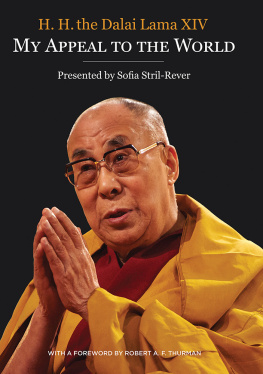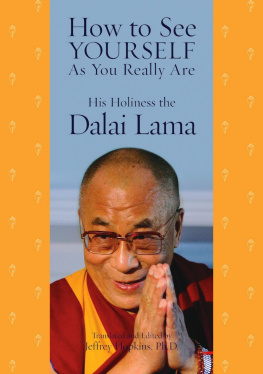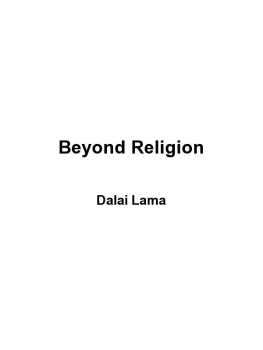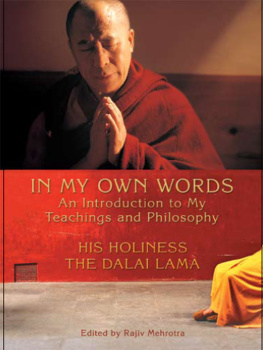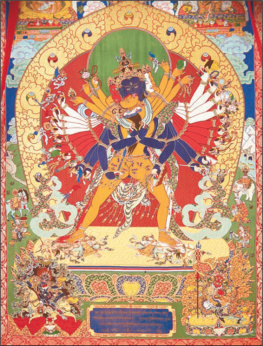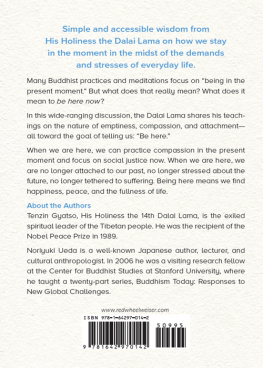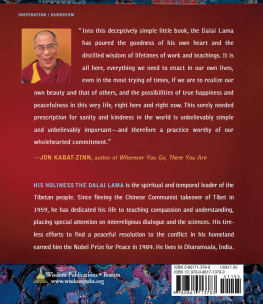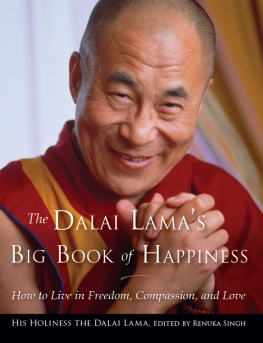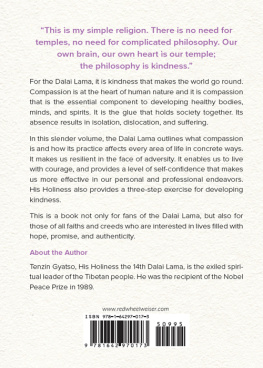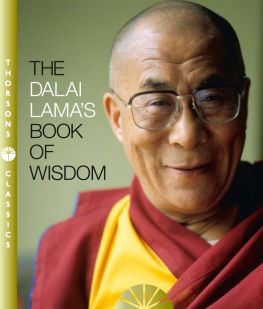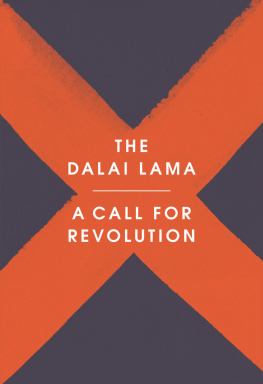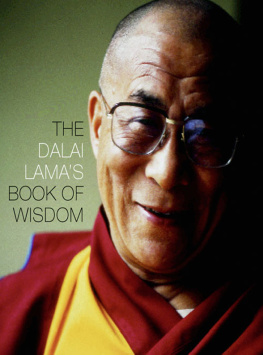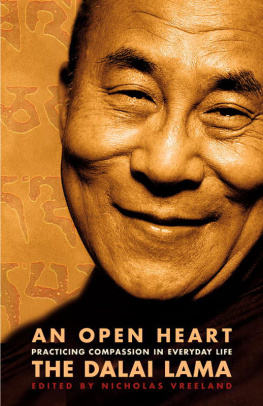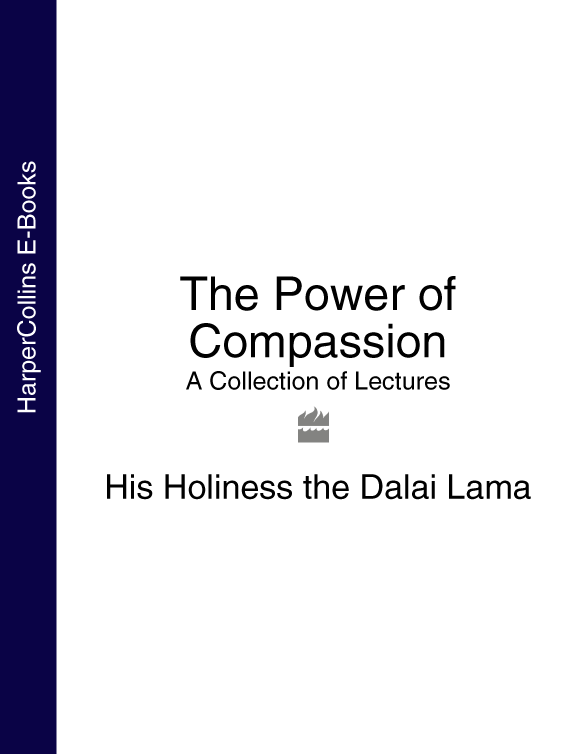
His Holiness the Dalai Lama is the head of state and spiritual leader of the Tibetan people. He is also regarded as the worlds foremost Buddhist leader and the manifestation of Chenrezig, the Bodhisattva of Compassion.
A scholar and a man of peace, His Holiness the Dalai Lama has travelled the world, not only to raise international awareness of the enormous suffering of the Tibetan people, but also to talk about Buddhism and the power of compassion.
Since 1959 His Holiness has been living in exile in Dharamsala, India, after Chinas troops crushed a Tibetan National Uprising against Chinese rule in Tibet. China invaded Tibet in 1949/50.
In 1989 His Holiness was awarded the Nobel Peace Prize for his non-violent struggle for the liberation of Tibet. Since coming into exile he has met many of the worlds political and spiritual leaders, including President Clinton, Prime Minister John Major, President Vaclav Havel, His Holiness Pope John Paul, the Archbishop of Canterbury and Archbishop Desmond Tutu. He has shared with these leaders his views on human interdependence and his concerns about the arms trade, threats to the environment and intolerance.
His Holiness describes himself as a simple Buddhist monk. In lectures and tours, he disarms audiences with his simplicity, humour and great warmth. Everywhere his message is the same the importance of love, compassion and forgiveness.
The text for this book is taken from a series of public lectures given by His Holiness the Dalai Lama at Wembley Auditorium in London, England, in May 1993. Although hundreds of people were able to hear these lectures, many people have since asked the Office of Tibet, the official agency of His Holiness the Dalai Lama in London, for transcripts. The Office of Tibet is therefore delighted to be able to offer these words of His Holiness to a worldwide audience.
In the original lectures, His Holiness the Dalai Lama spoke mainly in English, but also to his official translator in Tibetan. The May 1993 visit was sponsored by The Tibet Foundation, London.
The Office of Tibet would like to thank Jane Rasch and Cait Collins for their many hours spent on transcribing the tapes. We would also like to thank His Holinesss translator, Geshe Thupten Jinpa, and Heather Wardle for their work in editing the text into book form.
Kesang Y Takla (Mrs)
Representative of His Holiness the Dalai Lama London
ONE
CONTENTMENT, JOY AND LIVING WELL

Concerned people have asked me to talk about certain subjects and about the best way to deal with the different situations of life. I will try to explain these things in such a way that ordinary people can see how to utilize their own potential in order to face unpleasant situations, such as death, and also mental frustrations, such as anger and hatred.
I am a Buddhist and my whole way of training is according to the Buddhist teaching or Buddha Dharma. Although I speak from my own experience, I feel that no one has the right to impose his or her beliefs on another person. I will not propose to you that my way is best. The decision is up to you. If you find some point which may be suitable for you, then you can carry out experiments for yourself. If you find that it is of no use, then you can discard it.
The basic fact is that all sentient beings, particularly human beings, want happiness and do not want pain and suffering. On those grounds, we have every right to be happy and to use different methods or means to overcome suffering and to achieve happier lives. These methods, however, should not infringe on the rights of others, nor should they create more suffering for others. It is worthwhile to think seriously about the positive and negative consequences of these methods. You should be aware that there are differences between short-term and long-term interests and consequences. If there is a conflict between the short-term interest and the long-term interest, the long-term interest is more important. Buddhists usually say that there is no absolute and that everything is relative. So we must judge according to the circumstances.
Our experiences and feelings are mainly related to our bodies and our minds. We know from our daily experience that mental happiness is beneficial. For instance, though two people may face the same kind of tragedy, one person may face it more easily than the other due to his or her mental attitude.
I believe that the idea that all human problems can be solved by machines or by matter is wrong. Of course, material facilities are extremely useful. At the same time, it is quite natural that all our problems cannot be solved by material facilities alone. In a material society there is just as much mental unrest and frustration, if not more. This shows us that we are human beings after all. We are not the product of machines and our bodies are different from purely mechanical things. Therefore, we must think seriously about our own inner abilities and deeper values.
I believe that if someone really wants a happy life then it is very important to pursue both internal and external means; in other words, material development and mental development. One could also say spiritual development, but when I say spiritual I do not necessarily mean any kind of religious faith. When I use the word spiritual I mean basic human good qualities. These are: human affection, a sense of involvement, honesty, discipline and human intelligence properly guided by good motivation. We have all these things from birth; they do not come to us later in our lives. Religious faith, however, comes later. In this regard, I believe that there are two levels to the various religious teachings. On one level, religious teachings talk about God or the Almighty, or, in Buddhism, about Nirvana and the next life. Yet on a different level, all religious teachings and traditions teach us to be good human beings, to be warm-hearted people. These religious teachings simply strengthen the basic human good qualities which we have from birth.
As humans, we all have the same human potential, unless there is some sort of retarded brain function. The wonderful human brain is the source of our strength and the source of our future, provided we utilize it in the right direction. If we use the brilliant human mind in the wrong way, it is really a disaster. I think human beings are the superior sentient beings on this planet. Humans have the potential not only to create happy lives for themselves, but also to help other beings. We have a natural creative quality and it is very important to realize this.
It is my belief that the human brain and basic human compassion are by nature in some kind of balance. Sometimes, when we grow up, we may neglect human affection and simply concentrate on the human brain, thus losing the balance. It is then that disasters and unwelcome things happen. If we look at different species of mammals, we will see that nature is very important and that it is a forceful factor that creates some sort of balanced way.
With the realization of ones own potential and self-confidence in ones ability, one can build a better world. According to my own experience, self-confidence is very important. That sort of confidence is not a blind one; it is an awareness of ones own potential. On that basis, human beings can transform themselves by increasing the good qualities and reducing the negative qualities. Transformation does not mean 100 per cent change. Without a basis of something to aim for, how do we develop good things? Buddhists call this potential Buddha Nature, which is also the fundamental Clear Light nature of the mind.


